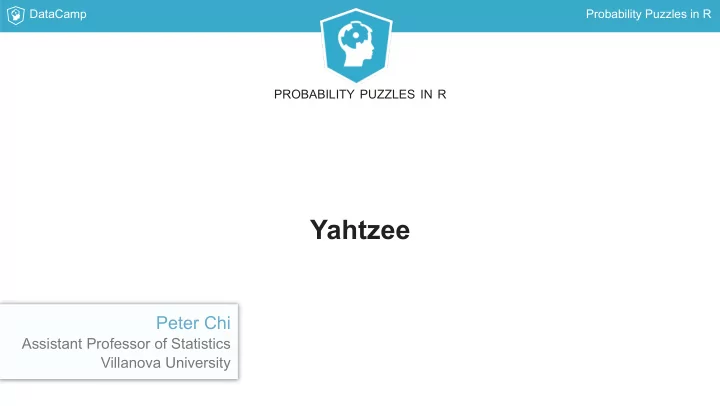

DataCamp Probability Puzzles in R PROBABILITY PUZZLES IN R Yahtzee Peter Chi Assistant Professor of Statistics Villanova University
DataCamp Probability Puzzles in R Yahtzee scoring
DataCamp Probability Puzzles in R Multiplication Rule k independent processes n possibilities for each i Total number of possibilities: n × n × … × n 1 2 k Example. Roll three dice. Total number of configurations: 3 6 × 6 × 6 = 6 6^3 [1] 216
DataCamp Probability Puzzles in R Permutations k objects n total possibilities Each possibility used once at most Total number of configurations: n ! n × ( n − 1) × ... × ( n − k + 1) = ( n − k )! Example. Number of ways for three dice to land as {2,3,4}: 3! 3 × 2 × 1 = = 3! (3 − 3)! factorial(3) [1] 6
DataCamp Probability Puzzles in R Addition Rule Given disjoint events A and B :: P ( A ∪ B ) = P ( A ) + P ( B ) Example 1. Probability of rolling {2,3,4} or {3,4,5} with three dice factorial(3)/6^3 + factorial(3)/6^3 [1] 0.05555556 Example 2. Probability of rolling three dice landing on the same denomination 1/6^3 + 1/6^3 + 1/6^3 + 1/6^3 + 1/6^3 + 1/6^3 [1] 0.02777778
DataCamp Probability Puzzles in R Combinations n total objects Choose k of them; order does not matter Total number of ways: n ! ( k n ) = k ! × ( n − k )! Example. Number of ways to choose 2 dice out of 3: 3 ) 3! ( 2 = = 3 2! × (3 − 2)! choose(3,2) [1] 3
DataCamp Probability Puzzles in R Combining rules Example. Roll 10 dice Number of ways to roll 5 of one denomination and 5 of another: n_denom <- factorial(6) / factorial(4) n_groupings <- choose(10,5) * choose(5,5) n_total <- n_denom * n_groupings n_total [1] 7560
DataCamp Probability Puzzles in R PROBABILITY PUZZLES IN R Let's calculate it!
DataCamp Probability Puzzles in R PROBABILITY PUZZLES IN R Settlers of Catan Peter Chi Assistant Professor of Statistics Villanova University
DataCamp Probability Puzzles in R Introduction to the game
DataCamp Probability Puzzles in R Simulating dice rolls roll_dice <- function(k){ all_rolls <- sample(c(1,2,3,4,5,6), k, replace = TRUE) final_answer <- sum(all_rolls) return(final_answer) } roll_dice(2) [1] 7 replicate(10, roll_dice(2)) [1] 8 10 10 2 11 5 4 6 11 7
DataCamp Probability Puzzles in R The table function rolls <- replicate(10, roll_dice(2)) rolls [1] 8 10 10 2 11 5 4 6 11 7 table(rolls) rolls 2 4 5 6 7 8 10 11 1 1 1 1 1 1 2 2
DataCamp Probability Puzzles in R Counting the number of occurrences rolls <- replicate(100, roll_dice(1)) sum(rolls == 3) [1] 22 if(sum(rolls == 3) > 17){ print("The value of 3 was rolled more than 17 times") } [1] "The value of 3 was rolled more than 17 times" if(sum(rolls == 3) > 17 | sum(rolls == 4) > 17){ print("The value of 3 or 4 was rolled more than 17 times") } [1] "The value of 3 or 4 was rolled more than 17 times"
DataCamp Probability Puzzles in R PROBABILITY PUZZLES IN R Let's try it!
DataCamp Probability Puzzles in R PROBABILITY PUZZLES IN R Craps Peter Chi Assistant Professor of Statistics Villanova University
DataCamp Probability Puzzles in R Introduction to craps Pass line bet - wager made at beginning of a round of play Shooter rolls first The first roll: 7 or 11: win bet 2, 3, 12: lose bet Any other value establishes point
DataCamp Probability Puzzles in R When a point is established Shooter's first roll: 5 = point Shooter continues to roll If 5 rolled before 7 - pass line bet won If 7 rolled before 5 - pass line bet lost Shooter continues to roll until 5 or 7
DataCamp Probability Puzzles in R While loop roll <- 0 while(roll != 6){ roll <- roll_dice(1) print(roll) } [1] 5 [1] 2 [1] 5 [1] 6
DataCamp Probability Puzzles in R Compound condition in a while loop roll <- 0 while( (roll != 6) & (roll != 5) ){ roll <- roll_dice(1) print(roll) } [1] 2 [1] 4 [1] 5
DataCamp Probability Puzzles in R The %in% operator roll <- roll_dice(1) if(roll %in% c(2,4,6) ){ print("The roll is even") } [1] "The roll is even" roll [1] 2
DataCamp Probability Puzzles in R PROBABILITY PUZZLES IN R Let's play some Craps!
Recommend
More recommend